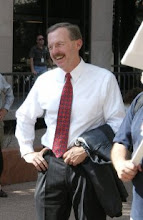 Comment: While the author may have a very flawed understanding of the unfortunate realities concerning foreign financing of American politicians, campaigns, parties, etc. -- he does raise excellent questions for his own countrymen to consider and their government to answer. One imagines that he does so at substantial personal risk. Courageous.
Comment: While the author may have a very flawed understanding of the unfortunate realities concerning foreign financing of American politicians, campaigns, parties, etc. -- he does raise excellent questions for his own countrymen to consider and their government to answer. One imagines that he does so at substantial personal risk. Courageous.Foreign Payments and Risk of Espionage
September 26, 2009, The Zimbabwe Times
Jupiter Punungwe
RECENTLY there was an outcry over allegations that some people working in the Prime Minister’s office were being paid astronomical stipends directly by foreign governments or some other non-Zimbabwean entity.
As is now common in Zimbabwe, the debate over the issue was heavily partisan, with very little attention paid to matters of principle. The risk of having someone with access to security sensitive information, or mere physical access to security sensitive buildings, being paid by foreign entities was not clearly analysed and debated. Clearly the Prime Minister’s office is a security sensitive area.
In short, there is need to thoroughly investigate whether the money is a benign stipend or maybe payment for espionage activities. It is not uncommon for government officials to receive money for supplying sensitive information to foreign governments. The case of Zanu-PF stalwart, Philip Chiyangwa comes to mind.
If the Prime Minister is actually allowing people in his office to get stipends from foreign governments, then he is dangerously naive. Such payments provide ample opportunity to cover for payments in return for espionage activities, such as those Chiyangwa was once alleged to have conducted.
Most governments, including the British and American governments do not allow any kind of foreign entity to even merely sponsor a political party, let alone directly pay high ranking government officials. These governments recognise the inherent espionage risks that are inevitably part and parcel of such activity.
One is also left with no choice but to call into question the competence of our security services. Where were they while the Prime Minister was allowing such a high risk setup to brew in his offices? Mind you it is their duty to appropriately advise all senior government officials on security matters. Do they even have proper security clearance and evaluation procedures? If those procedures allow someone, being paid by a foreign entity, daily unsupervised access to sensitive government buildings and installations, then those procedures might as well be flushed down the toilet.
A competent security establishment would have detected the anomaly and provided correct advice to the Prime Minister long before the matter was splashed in news headlines. As it is, it took a Namibian to correctly evaluate the dangers of the setup and make the issue public.
In their defence, the Prime Minister’s office complains that the Public Service Commission has not ‘formalised’ the appointment of some people in the Prime Minister’s office. I would expect that the PSC has a set of established rules and procedures to follow when recruiting people to fill the posts it controls. Posts that are not controlled by the PSC are usually sworn in, for example ministerial and judicial posts.
The PSC is a non-partisan commission, which is supposed to pick the most suitable candidates based on specific requirements for the post, interview procedures and advertising requirements. It is supposed to ensure a fair process for all the qualified people who may wish to apply. The PSC should not be part of a process in which a senior government official picks someone for reasons of personal favouritism and then wants the PSC to rubberstamp the charade. What would stop government officials from appointing their small-houses (mistresses), goat herding nephews, muchaiwa or beer-guzzling uncles and even political bum-lickers, who would be absolutely not suitable for the posts?
If the Prime Minister’s office went through the proper laid down recruitment procedures and then the PSC failed to formalise that process then I would agree that they have an issue to complain about. If not then they actually have a case to answer for.
Mind you unaccountable favouritism, nepotism and cronyism are the very practices through which Zanu-PF has progressively mismanaged Zimbabwe, with disastrous consequences which I do not need to repeat here.
I will not delve too much into the credibility of the Prime Minister given his past claims that everyone in government was surviving on a hundred American dollars a month. At that time I pointed out a number of simple facts, such as the amount of school fees required for the children of certain officials, which made his claims implausible.
If true, revelations that some officials, working in his office, are being paid stipends outside of their salaries, will only serve to confirm what some of us have suspected all along – that the Prime Minister’s affinity to straightforward statements is proving to be a lot like mercury’s affinity to a glass surface.




No comments:
Post a Comment